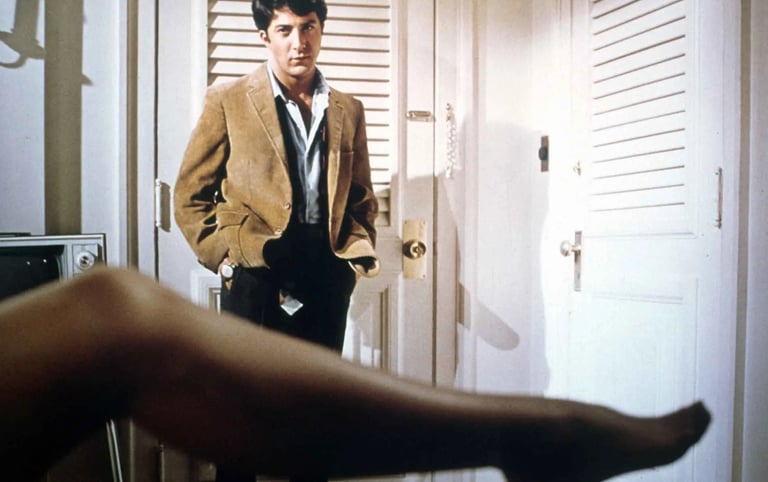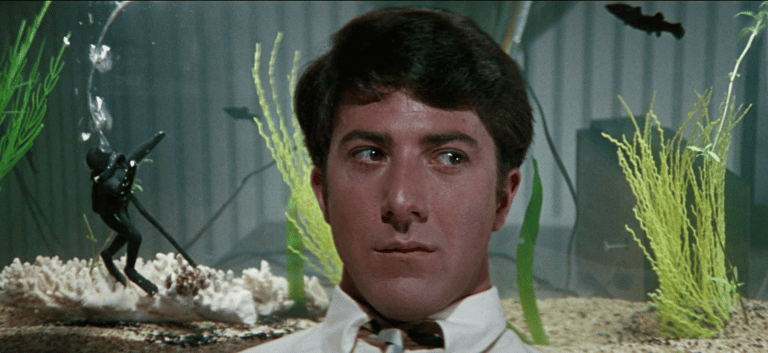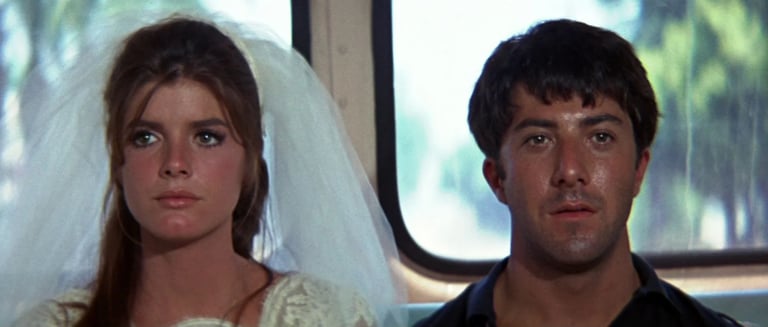The Graduate (1967): Framing Uncertainty Through Cinematography
How does The Graduate (1967) express Benjamin's 'purposeless' future? Discover how close-ups, long takes, and cutting techniques in key scenes reveal his bewildered state and the film's commentary on youthful uncertainty


The film follows the interior struggle of a recent college graduate, Benjamin Braddock, who remarks, "I'm worried about my future." Drawing on specific examples from only one to two scenes, make an interpretive claim about how two formal devices of cinematography and or editing function as an expression of Benjamin’s subjective state.
The romantic-comedy film "The Graduate" explores the reality of American young adults being "worried" about the future due to their appearance, academic, and family background success, thus leading the youth to make "falsehood" decisions in their future events. Rather than criticizing the youth's unsophisticated decision, however, the film illustrates the effective use of cinematography and editing, demonstrating how the main character, Benjamin Braddock, expresses his lack of self-goal. Benjamin Braddock's affair with Mrs.Robinson accentuates the anxiety of a "purposeless" future through his bewildering behavior toward Mrs.Robinson's seduction. The scene starts with a close-up shot of a fish tank and Benjamin's ambiguous face. Mrs. Robinson comes in through the door; later on, when Benjamin drives Mrs.Robinson home and comes to Elaine's room, this scene persists using close-up shots and the long take. Ben expresses his "emptiness" through this cinematography choice, and Mrs. Robinson manipulates it through her fearless requests with a cynical facial expression. Thus, Ben obeys them by chasing the key, taking her home, and bringing the purse to Elaine's room. Also, using long-take indicates that Mrs. Robinson and Ben's conversation becomes strange, allowing the audience to see Benjamin's confusion from beginning to end throughout their discourse. Reaching this scene climax, when Mrs.Robinson is nude in front of Ben, the close-up shot and alternate "Cut" of Benjamin's face and Mrs. Robinson's naked body reveals Benjamin is shocked toward Mrs. Robinson's deviation behavior. Consequently, Benjamin hustles down the stairs to avoid his solicitude and escape from Mrs. Robinson's temptation.


Although Benjamin chooses to marry Elaine, he still expresses the same attitude of being aimless for his future in the ambiguous, happily ending scene. When Benjamin and Elaine get on the yellow bus, it starts with a cut shot between this couple and the other "elder" passengers on the bus, demonstrating the elders' judgment of Elaine and Benjamin's behavior as awkward and impulsive. Hence, this editing choice will grab the audiences' attention for Elaine and Benjamin and strengthen the effect of the long take and close-up shots, allowing the audience to see their facial expression change from laughing to smiley and then neutral and aimless. This strange moment physically indicates that Elaine and Benjamin are enjoying their happiness in a romantic relationship. Simultaneously, they are also confused about the next step in constructing their "long-term" relationship plan due to their lack of life experience and self-goal.


The ending's scene of uncertainty